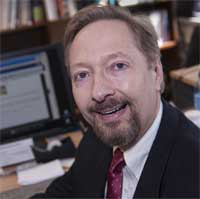 KINGSTON, R.I. – April 29, 2013 – Nicolai N. Petro, a professor of political science at the University of Rhode Island, has received a Fulbright research grant to study the role of the Russian Orthodox Church while living abroad in Ukraine.
KINGSTON, R.I. – April 29, 2013 – Nicolai N. Petro, a professor of political science at the University of Rhode Island, has received a Fulbright research grant to study the role of the Russian Orthodox Church while living abroad in Ukraine.
Earlier this year, Petro signed a book contract with Stanford University Press to publish his next book, Blessed Is the Kingdom: The Orthodox Church and the Struggle for the Soul of Modern Russia. His Fulbright will give him the time he needs to research and write his book.
“My wife and I are thrilled to have this opportunity to build on the contacts that URI has made with Ukraine in the past few years,” says Petro, of Kingston, who plans to leave in July. “Both Ukraine and the role of religion in politics are of increasing importance to U.S. foreign policy.”
The Russian Orthodox Church was in the news last year for its views on social policy, scandals involving the wealth of senior clergy, and criticism by the punk rock group “Pussy Riot.”
Petro, however, suggests that closer cooperation between the Russian Orthodox Church and the Russian state is likely to result in a more modern and stable country. The argument is based on important trends often overlooked, says Petro.
Chief among these is the rise of religious belief in Russian society. While many Western analysts view Eastern Orthodoxy as reactionary, Petro argues that this opinion reflects the limited knowledge of the Orthodox tradition in the West, as well as parochialism about what should be considered “modern.”
In fact, Petro argues that there is no reason why religion should be considered incompatible with modernization. Religion, he says, can become an essential part of national modernization as a country moves from political transition to political consolidation.
His view is that Russia might be entering a period of prolonged political stability, due to the growing social and political influence of the Orthodox Church.
In Ukraine, Petro will be affiliated with the Social Sciences Institute of Odessa’s I.L. Mechnikov National University.
One of the two anonymous professors who reviewed Petro’s Fulbright proposal said he cannot imagine a more qualified scholar to carry out the project: “He will bring into focus a critical question that U.S. and other Western analysts have left largely unexamined, namely, the necessary tie between modernity and secularity. His work will undoubtedly become a central component in the developing debate among the broadest audience of social scientists. The book – because of its well informed argument and challenges to taken-for-granted ideas – will become the object of a great deal of debate and comment among scholars and other observers for years to come.”
Winifred Brownell, dean of Arts and Sciences at URI, says she is thrilled that Petro received the award.
“He certainly deserves this prestigious honor, and I am pleased that it will help him achieve the goals of his sabbatical project,” Brownell says. “Nicolai is one of our top international scholars and he will make outstanding contributions there that will enhance both his reputation and the reputation of URI.”
Petro received his doctorate in foreign affairs in 1984 from the University of Virginia. From 1989 to 1990, he was an International Affairs Fellow of the Council on Foreign Relations and served as special assistant for policy in the Office of Soviet Union Affairs in the U.S. Department of State, as well as a temporary political attaché at the U.S. Embassy in Moscow.
While in the Soviet Union he monitored local elections in central Russia, Belarus, and Latvia. From 2001 to 2002, he returned to Russia privately to work as a staff consultant to the municipal research and training center Dialog and as an advisor to the mayor of the Russian city Novgorod the Great. He joined the political science department at URI in 1991.
He has won numerous awards, including a Fulbright Lectureship to Russia, a Thornton D. Hooper Fellowship at the Foreign Policy Research Institute, and research awards from the National Council for Eurasian and East European Research. Last year, he was invited to advise the World Economic Forum in Davos, Switzerland on its “Scenarios for the Russian Federation” initiative.
His articles have appeared in many newspapers and journals, in both the United States and Russia. He is also the author or editor of eight books, including Crafting Democracy: How Novgorod has Coped with Rapid Social Change, The Rebirth of Russian Democracy: An Interpretation of Political Culture, and Russian Foreign Policy: From Empire to Nation-State, co-authored with Alvin Z. Rubinstein.
Pictured above
Nicolai N. Petro, a professor of political science at the University of Rhode Island who has received a Fulbright grant to study the role of the Russian Orthodox Church in Ukraine.
Photo by Michael Salerno Photography

